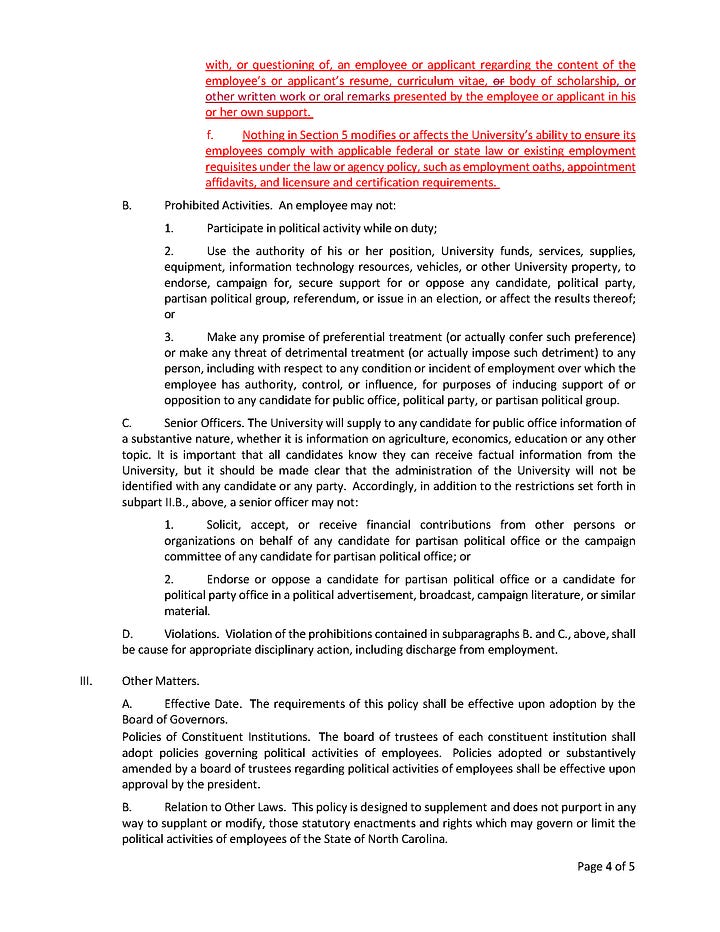The University of North Carolina-Chapel Hill (UNC-CH) is just one of the major universities in the Triangle which has become a cultural battleground as both the governing authorities and grassroots/activist organizations are converging to combat the influence of “radical, divisive, and discriminatory” ideologies like Critical Race Theory and “anti-racism”.
NC State
NC State was quick to reverse course after the Carolina Partnership for Reform highlighted an essay question and expressed concern about requiring applicants to explain how they would “contribute to a more diverse and inclusive N.C. State environment”. Just days later, the UNC Board of Governors (which supervises the entire UNC System) approved a “Prohibition on Compelling Speech” which would ban any similar requirement for employees or potential students.


UNC-Chapel Hill
At a lower governance level, the UNC-CH Board of Trustees passed a resolution for a “School of Civic Life and Leadership”, as first reported by a Wall Street Journal editorial supporting the development, which would “create a new school committed to free expression in higher education”.
On the other hand, advocacy organizations like Do No Harm (DNH) and Color Us United (CUU) are working from the bottom up to oppose “radical political ideologies” or a “false social justice agenda” at UNC-CH.
This convergence is no accident. As Kenny Xu, president and primary spokesman of CUU tells me: “We are asking the UNC medical school really as a representative of all the medical schools in the country: the one that we're capable of influencing due to the conservative nature of the state…I think UNC has some of the most mobilized trustees in the nation, at least on the right side of things.” CUU is gathering signatures on a petition to the Dean of the UNC School of Medicine to reverse course on the “Task Force to Integrate Social Justice into the Curriculum”.
Xu is also a board member of Students for Fair Admissions, which currently has a case pending before the Supreme Court which would challenge the legality of the affirmative action practices at Harvard and UNC-CH.
DNH is another organization raising concerns about the prioritization of political ideologies at the UNC School of Medicine. In addition to a report titled “A Dangerous Prescription at UNC’s School of Medicine”, DNH has filed civil rights complaints against multiple programs, scholarships, and events limited to black or non-white students. At least one complaint, against the Fellowship for Exploring Research in Nutrition, was dropped after the program quietly removed the discriminatory requirement.
Duke University
Unlike NC State and UNC-CH, Duke University is a private university, not part of the UNC System. This presents a different challenge, according to Laura Morgan, a Registered Nurse and Program Manager with DNH : “the fact that they are private institutions means that we have no ability to gain access to anything by a public records request.”
“Those schools have quite an alumni base, and they will ask their alumni for donations. And we do hear from alumni of some of these schools that say ‘I had no idea this was going on and I’m not willing to support it anymore’”, says Morgan. “Regardless of whether it’s public money or private money, we just really want to call attention to it so that the public knows what’s happening in their local medical schools, or even their alma maters.”
Morgan also pointed to a civil rights claim filed regarding the Duke University PRIME-PREP Program, which is only open to applicants belonging to “underrepresented groups”.
Conclusion
Both Morgan and Xu pointed to whistleblowers as an important role for North Carolinians who would want to get involved. Y’all can contact Color Us United or Do No Harm via their websites.


